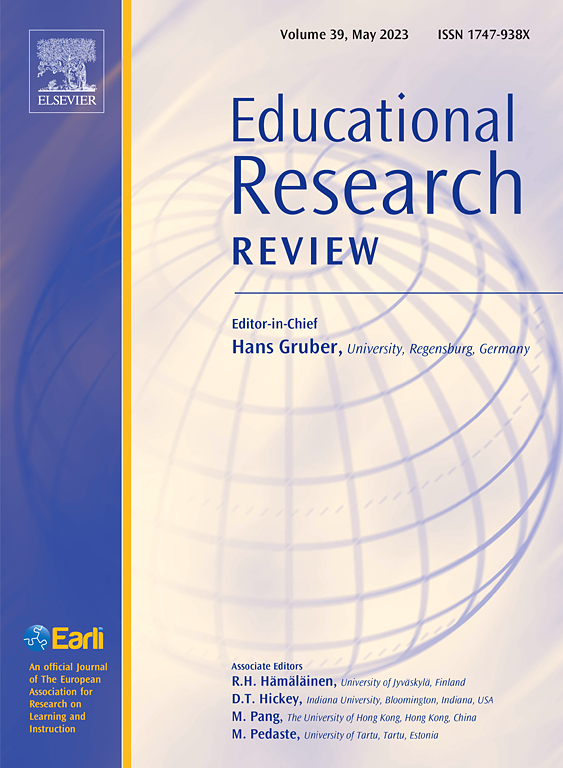Robotic roles in education: A systematic review based on a proposed framework of the learner-robot relationships
IF 10.6
1区 教育学
Q1 EDUCATION & EDUCATIONAL RESEARCH
引用次数: 0
Abstract
With the development of computer and information techniques, robotics education provides potential to reshape the instructional and learning process in the educational system. From the perspective of the educational system, it is essential to understand the roles of robotics in education as well as their relationships with learners. Specifically, this systematic review proposed a conceptual framework based on two dimensions (i.e., learner agency, robotic interactivity) and reviewed 92 empirical studies from 2010 to 2023 to clarify four categories of robotic roles, namely learning about robotics, learning through robotics, learning from robotics, and learning with robotics. In learning about robotics, educational robotics are merely the learning objects or contents by learners. In learning through robotics, educational robotics serve as the learning tools or assists, and learners can take their agency to operate or design robotics. In learning from robotics, educational robotics act as tutors to convey and deliver knowledge and information to learners. In learning with robotics, educational robotics serve as the peers or companions of learners and collaborate with learners to provide emotional supports, solve problems and construct knowledge. Furthermore, this study examined the applied educational contexts (i.e., educational domain, educational level) and learning effects of the four robotic roles. Overall, the future development of robotics education highlights both learner agency and robotic interactivity to achieve the goal of a learner-centered, robot-friendly learning.
机器人在教育中的角色:基于提出的学习者-机器人关系框架的系统回顾
随着计算机和信息技术的发展,机器人教育为重塑教育系统中的教学和学习过程提供了潜力。从教育系统的角度来看,了解机器人在教育中的作用以及它们与学习者的关系是至关重要的。具体而言,本系统综述提出了一个基于两个维度(即学习者代理、机器人交互性)的概念框架,并回顾了2010年至2023年的92项实证研究,明确了机器人角色的四类,即学习机器人、通过机器人学习、从机器人学习和用机器人学习。在学习机器人的过程中,教育机器人仅仅是学习者学习的对象或内容。在机器人学习中,教育机器人作为学习工具或辅助工具,学习者可以利用自己的代理来操作或设计机器人。在学习机器人的过程中,教育机器人充当导师的角色,向学习者传达和传递知识和信息。在机器人学习中,教育机器人作为学习者的同伴或伙伴,与学习者合作,提供情感支持,解决问题和构建知识。此外,本研究还考察了四种机器人角色的应用教育背景(即教育领域、教育水平)和学习效果。总体而言,机器人教育的未来发展强调学习者代理和机器人交互,以实现以学习者为中心,机器人友好的学习目标。
本文章由计算机程序翻译,如有差异,请以英文原文为准。
求助全文
约1分钟内获得全文
求助全文
来源期刊

Educational Research Review
EDUCATION & EDUCATIONAL RESEARCH-
CiteScore
19.40
自引率
0.90%
发文量
53
审稿时长
57 days
期刊介绍:
Educational Research Review is an international journal catering to researchers and diverse agencies keen on reviewing studies and theoretical papers in education at any level. The journal welcomes high-quality articles that address educational research problems through a review approach, encompassing thematic or methodological reviews and meta-analyses. With an inclusive scope, the journal does not limit itself to any specific age range and invites articles across various settings where learning and education take place, such as schools, corporate training, and both formal and informal educational environments.
 求助内容:
求助内容: 应助结果提醒方式:
应助结果提醒方式:


